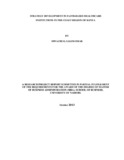| dc.description.abstract | The role of faith-based organizations (FBOs) in development and in community work cannot be gainsaid. Faith-based healthcare institutions (FBHIs) are a unique subgroup of FBOs that have unexplained commonalities with secular healthcare providers and while lying on the opposite end of the spectrum do contribute to more than half the area of healthcare coverage map. Governments all over the world have come to the realization that FBOs are seen by beneficiaries of their services as accessible and trustworthy. Students of strategic management will not fail to generate interest in the wide scope of activities of FBOs. Included in the long list of questions such interest may generate is whether this wide reach is boosted by the sponsors or by missionary spirit. There is as well the unanswered call to help the minority groups in the society and the wish to handle healthcare taboos embedded in a people’s faith. Cultural incompetency is known to be an impediment in delivering services or doing business with closed communities just as with those of wide diversity. The issue of diversity and inclusiveness has been accepted into management discussions and strategy plans only to a superficial level. Most managers accommodate diversity of faith for the sake of avoiding friction and personal differences but do not use this as input to strategy. The existing literature in this subject is focused how donor agencies use faith as channel of access to reach target populations and there is a lot of work done on evaluation of how charitable organizations get financial resources, how they account for their budgets and whether being faith-based earns them special policy privileges from host or donor governments. All these issues do not delve in the subject of development of strategy and there are no matching studies to highlight the approaches attributable to realized strategies. Schools of thought in strategic management dispose that the approaches to strategy development are a myriad but can be clustered in to three basic groups. This comprises of the prescriptive, descriptive and integrative schools. The theories posit a setting where none of the individual schools can exist in isolation such that an organization can be described as exclusively belonging to a specific school. Realized strategies are invariably a mix of multiple schools in varying proportions. The determinants to strategy development among FBHIs can be presumed to be largely faith-based. However, religiosity and faith permeation in business can be a self-limiting factor. It would therefore be the assumption that FBHIs serve faith communities with exclusion of out-groups but then this renders the organization short-lived since some faith communities are of small populations that cannot sustain the business. This study sought to expose the inclination of strategy development among FBHIs to the already established schools of thought. Further, it tried to bring out the determinants of strategy traceable such that policy makers, the government and new entrants can be guided accordingly. It was shown that religious affiliation is not a strong drive to strategic partnership and resourcing. Determinants of strategy emerged to be one of four categories; value-based, pricing-related, resourcing-related or faith-related. FBHIs exhibited strong presence of the cultural, positioning and political schools significantly stronger dominance than all the other six combined. There is lack of government policy that fosters mushrooming of FBHIs and the FBHIs do not have a common forum for nurturing their strategic ideals. It is recommendable that such a forum be institutionalized to boost inter-FBHI relations so that strategic management learning points are shared. | en |

